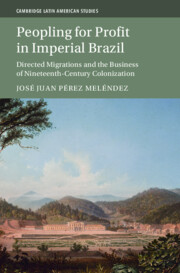 Peopling for Profit in Imperial Brazil
Peopling for Profit in Imperial Brazil Book contents
- Peopling for Profit in Imperial Brazil
- Cambridge Latin American Studies
- Peopling for Profit in Imperial Brazil
- Copyright page
- Dedication
- Contents
- Figures
- Tables
- Acknowledgments
- Note on Currency and Language
- Abbreviations
- Maps
- Introduction
- Part I Colonization’s Statecraft
- Part II Colonization Companies and the Colono Trade
- 3 Shareholder Oligarchies
- 4 Palatial Diplomacy
- 5 Brazil’s Great Transformation
- Part III Disentangling Companies and State
- Part IV Peopling the Country of the Future
- Conclusion
- Bibliography
- Index
- Series page
3 - Shareholder Oligarchies
The First Homegrown Companies
from Part II - Colonization Companies and the Colono Trade
Published online by Cambridge University Press: 26 September 2024
- Peopling for Profit in Imperial Brazil
- Cambridge Latin American Studies
- Peopling for Profit in Imperial Brazil
- Copyright page
- Dedication
- Contents
- Figures
- Tables
- Acknowledgments
- Note on Currency and Language
- Abbreviations
- Maps
- Introduction
- Part I Colonization’s Statecraft
- Part II Colonization Companies and the Colono Trade
- 3 Shareholder Oligarchies
- 4 Palatial Diplomacy
- 5 Brazil’s Great Transformation
- Part III Disentangling Companies and State
- Part IV Peopling the Country of the Future
- Conclusion
- Bibliography
- Index
- Series page
Summary
A “spirit of association” took hold of Brazilian businessmen and lawmakers in the Regency period of the 1830s. This spirit manifested itself in the Rio Doce Company drive, which directly inspired Brazilians to launch the first homegrown colonization companies in Salvador and Rio de Janeiro. This chapter traces the trajectory of these pioneering domestic enterprises and examines their operations and their meanings in the context of continuous logistical and political challenges both at home and abroad. Ultimately, these companies set a precedent in institutionalizing reception and conveyance mechanisms, lobbying successfully for pro-colonization policies, and collaborating with the Brazilian diplomatic corps to build a powerful international network of migrant recruitment overseas. Despite these companies’ broad appeal among quarreling elites, both faltered amid the financial crisis of 1837,. The colono trade they spurred in periodic overlap with the illegal slave trade, however, opened the door for continued undocumented migrations from the Azores.
Keywords
- Type
- Chapter
- Information
- Peopling for Profit in Imperial BrazilDirected Migrations and the Business of Nineteenth-Century Colonization, pp. 81 - 119Publisher: Cambridge University PressPrint publication year: 2024
